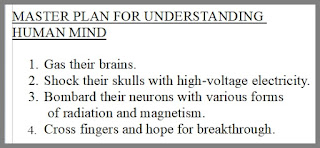The
BRAIN Initiative is a multi-year
big-science project launched during the Obama administration in 2013.
It started off in 2014 with a budget of about $110 million, and its funding
has increased in subsequent years, with some estimating that it may
use up billions in funding before it is finished. One of its
documents claims on page 121 that the BRAIN Initiative ”will require new and distinct funding of between 300-500 million per year." Too bad the program consists largely of not-terribly-useful research designed to try to prove an extremely dubious mechanistic
ideology about the mind.
The
assumptions behind the project are made clear in a document called
Brain 2025: A Scientific Vision,
which is offered at one of the project's two main web sites. The
“scientific vision” laid out in the document is largely an ideological vision, based on the far-fetched idea
that the human mind is merely the product of the brain. The dubious
ideology of the authors is made clear in the very first sentence of
the document, in which the authors state, “The human brain is the
source of our thoughts, emotions, perceptions, actions, and memories;
it confers on us the abilities that make us human, while
simultaneously making each of us unique.” It has certainly not
been proven that any brain has ever generated a thought or stored a
memory.
In
fact, later in the document the authors confess, “We do not yet
have a systematic theory of how information is encoded in the
chemical and electrical activity of neurons, how it is fused to
determine behavior on short time scales, and how it is used to adapt,
refine, and learn behaviors on longer time scales.” This is
certainly true. No one has anything like a systematic theory of how a
brain could store memories as neural states, nor has anyone come up
with anything like a systematic theory of how a brain could generate
a thought. So why, then, does the document start out by stating that
“the human brain is the source of our thoughts, emotions,
perceptions, actions, and memories”? No one has any business making
such a claim unless he first has “ a systematic theory of how
information is encoded in the chemical and electrical activity of
neurons,” but the document admits that no such theory exists.
The
document makes clear that the main purpose of the BRAIN Initiative
will be to shore up mechanistic ideas about the human mind. The
document states, “The most important outcome of the BRAIN
Initiative will be a comprehensive, mechanistic understanding of
mental function that emerges from synergistic application of the new
technologies and conceptual structures developed under the BRAIN
Initiative.” That makes it pretty clear that the project is
ideology-driven. The idea that mental function can be explained
mechanistically is a very doubtful piece of ideology inconsistent with
many forms of evidence. One of these forms of evidence involves the many cases of minds that worked well after half or more of the brain was
lost to injury, disease or surgery. Another such form of evidence is
that scientists cannot find any plausible storage place in the brain where
memories could be stored for 50 years, synapses (subject to very rapid molecular turnover) being no such thing.
What
are some of the things that this BRAIN Initiative will be spending
money on? Most of the project's money will apparently be spent as follows:
- Trying to develop new tools to study the brain.
- Creating circuit maps of the brain.
- Identifying various types of brain cells.
- Playing around with zapping people's brains in various different ways.
There
is no reason to believe that any of this activity will actually
result in the project's goal of a “comprehensive, mechanistic
understanding of mental function” or even something much smaller, a
fragmentary mechanistic
understanding of mental function. There is no “circuit map” that
we can possibly imagine that would allow us to understand how neurons
might produce thoughts, how neural activity could result in such a
thing as selfhood, or how human episodic memories could ever be
stored as neural states. No real insight into such things has been
produced by previous efforts to identify different types of brain
cells or map out the connections of the brain. So why should we
believe that any further insight on these matters will come from
further activity along these lines?
In
a section entitled “Manipulating circuit activity,” the Brain
2025 document tries to suggest that electrically zapping people's
brains might tell us something about memory. It says, “In
the 1950s, Penfield’s electrical stimulation experiments suggested
that a memory or thought could be elicited by activating neurons in
the underlying network.” But the document fails to tell us that a
review of 80 years of electrical stimulation of the brain found that
it was very rare for people to recall anything during electrical
stimulation of the brain and that “Overall,
only one patient reported what appeared to be a clearly detailed
episodic memory for which he spontaneously specified that he had
never thought about it.”
But nonetheless the BRAIN Initiative fellows expressed great
enthusiasm for monkeying with people's brains. After noting
approvingly that “stimulating electrodes are being placed in human
patients,” the BRAIN 2025 document says, “Entirely new tools
could be developed based on magnetic stimulation, gases, infrared
excitation, ultrasound, or organic or physical chemistry to allow
access to neurons deep within the brain.” It sounds like their
plan is kind of like this:
So
far the BRAIN Initiative has been running for four or five years, and
has accomplished nothing extremely noteworthy. Our understanding of
the brain has not dramatically advanced during those four or five
years, and all the old mysteries of mind and memory seem as
mysterious as ever. At this “Achievements” link there is a
discussion of what the BRAIN Initiative has accomplished so far. At
the top of the text is a big bold headline saying “Transformative
Advances,” but the BRAIN Initiative has produced no such
transformative advances. Go beyond the flashy spin on the web site,
the high-tech glitter, and the discussion of things in progress that
haven't yet yielded much, and you have not a single major
accomplishment relating to our understanding of the mind or memory.
You see in this section a video entitled “The BRAIN Initiative –
the First Five Years.” The video fails to list a single
accomplishment of the BRAIN Initiative. Apparently all this work to
mechanistically explain the mind is pretty much a flop and a failure
so far.
About
the only memorable thing mentioned in the BRAIN Initiative's list of
accomplishments is a description of some “brain interface” by
which a paralyzed person was able to use to raise a robot arm to
bring a cup to his mouth. Such an interface doesn't seem very
impressive when you consider that the same effect could have been
achieved much less expensively and more simply by using a
1990's-style voice-based interface that would respond to a command
such as “raise arm.”
I
predict that even after spending billions, the BRAIN Initiative will
by 2025 produce no big breakthrough in our understanding of mind,
memory or consciousness. All attempts to understand such things
through mechanistic methods (such as creating circuit diagrams or
zapping brains) are doomed to failure. The reason is that mind,
memory and consciousness are not mechanistic products of the brain,
but are aspects of a human soul or spirit that cannot be understood
by analyzing electricity, neurons and chemistry. If our minds were
produced by brains and our memories were stored in brains, we would
have already discovered by now “smoking guns” of such mechanistic
effects; but no such things have been found.
We
found in the 1950's that all cells have encoded information in the
form of the genetic information in DNA. If our brain cells contained
encoded memory information, we would have discovered abundant
fingerprints of such a thing during the twentieth century. But even
though it is 65 years after DNA was discovered, and even though our
electron microscopes can see things 1000 times smaller than synapses,
no one has discovered any proof of memories encoded in neurons. Such
a mechanistic encoding would require thousands of dedicated genes, to
accomplish the gigantic task of translating our experience and ideas
into neuron states; but not one such gene has been found, even though
the human genome has been thoroughly studied. There is one scientific study claiming to have found correlation evidence for such memory-encoding genes, but the study's methodology is quite goofy, for the reasons discussed at the end of this post.
A better approach for gaining insight about the mind would be one that focused on extraordinary human experiences, and people having ordinary mind and memory function despite extraordinary brain states. This would involve studying all the people whose minds functioned well even after they lost vast parts of their brains due to surgery or disease, all the people with phenomenal memories despite having ordinary brains, and all the people having extraordinary experiences such as near-death experiences and out-of-body experiences, often while their brains were shut down. Such a study approach would tend to shed light on how mechanistic neuroscientists are making the wrong assumptions about the brain.


No comments:
Post a Comment